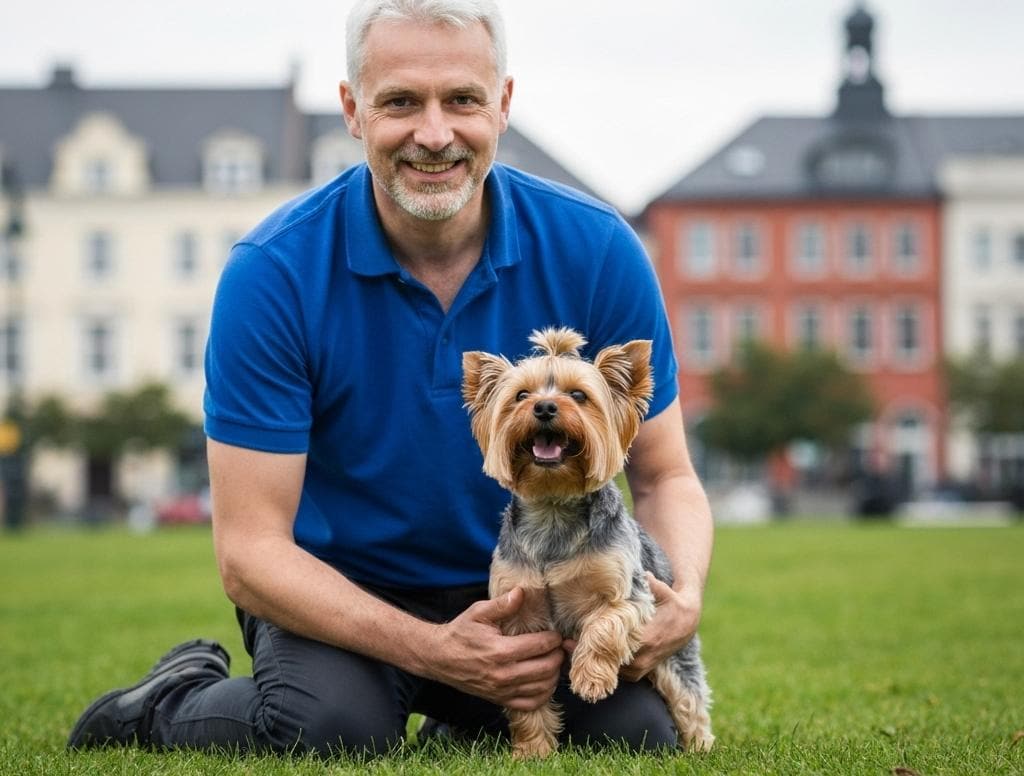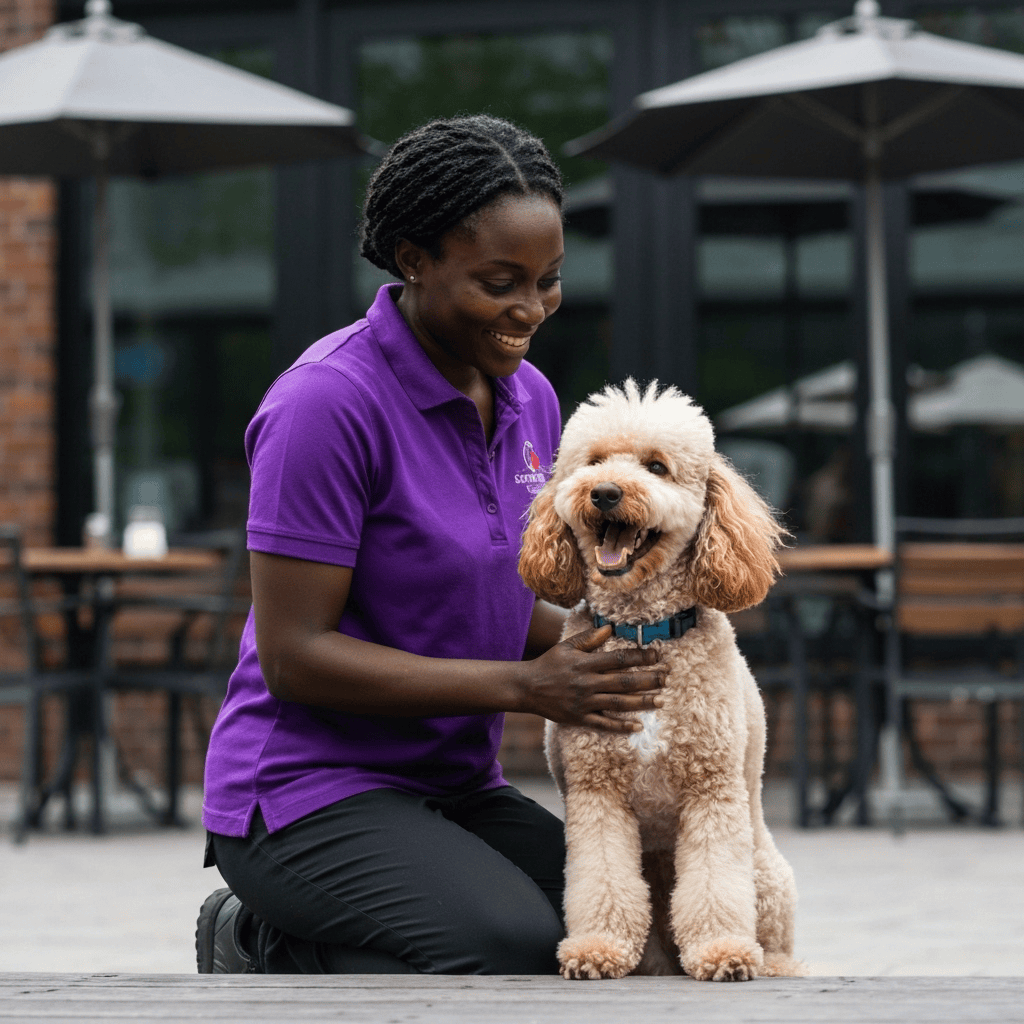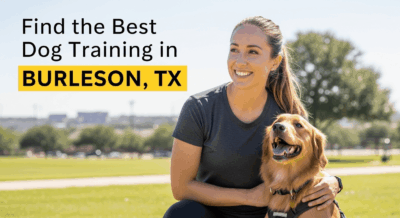Your Complete Guide to Choosing a Dog Trainer in Burleson
When you’re walking your dog through Old Town Burleson or letting them stretch their legs at Bailey Lake, you want to feel confident they’ll listen when it matters. Living here means your dog encounters everything from busy sidewalks during summer festivals to kids on bikes racing through the neighborhoods that span Johnson and Tarrant counties.
The best training happens when your dog learns skills they’ll actually use in real Burleson situations. Whether you’re headed to Chisenhall Fields for a weekend game or taking evening walks along Renfro Street, your dog needs manners that work in the moment.
How to Choose the Right Trainer
Start by looking for someone who explains their methods clearly and keeps dogs comfortable while they learn. Positive reinforcement training builds skills through rewards rather than corrections, which creates dogs who want to work with you instead of dogs who comply out of fear.
Many skilled trainers earn credentials like KPA-CTP, CPDT-KA, and IAABC-CDBC. If you want to understand what these letters mean, this guide to dog trainer certifications breaks down the different programs in plain language.
Think about where you actually spend time with your dog. If Saturday mornings find you at the farmers market or walking the trails that connect to Fort Worth, ask potential trainers how they’ll help your dog stay focused around those specific distractions.
Common Dog Training Methods That Work in Burleson

The training approach that works best here combines kindness with practical skills your dog will use around town.
Reward-based obedience training teaches the basics like sit, stay, come, and loose leash walking by rewarding good choices. This foundation makes everything easier, from vet visits to browsing the shops in Old Town.
Puppy training focuses on socialization and house manners during those critical early months. A well-socialized puppy becomes a dog who can handle the sights and sounds of youth baseball games or outdoor dining without stress.
Behavior modification addresses specific issues like reactivity, fear, or aggression using gradual exposure and positive associations. This helps dogs who struggle with other dogs, bikes, or crowded events learn to stay calm and focused.
You might choose in-home training if your dog’s challenges happen mostly at home, or if you want personalized attention on specific goals. Group classes cost less and give your dog practice around others, while day training lets a professional do the repetitions during the week before teaching you how to maintain the skills.
Avoid any trainer who talks about dominance or uses intimidation. Those old-fashioned approaches can backfire and create more problems, especially for dogs who need to stay calm in busy public spaces.
What Dog Training Costs in Burleson
Training prices in Burleson are similar to the greater Dallas-Fort Worth area, with some variation based on the trainer’s experience and travel time.
| Service Type | Average Cost (Burleson/Johnson County) |
|---|---|
| Group classes, 4–6 weeks | $150 – $275 |
| Private lessons, 60–90 minutes | $100 – $165 per session |
| In-home puppy training package, 4–6 visits | $400 – $700 total |
| Day training, 3–5 sessions weekly | $450 – $900 per week |
| Board and train, 2–4 weeks | $1,800 – $4,000 total |
| Behavior consult for reactivity/fear | $125 – $225 initial session |
Before you commit, ask what’s included in these prices. Some trainers charge extra for travel, while others build it into their rates. Find out about homework support, follow-up sessions, and what happens if you need to reschedule.
Local Rules Every Burleson Dog Owner Should Know
Since Burleson sits in both Johnson and Tarrant counties, you’ll follow city regulations for most day-to-day situations.
Your dog needs to be leashed or under control whenever you’re off your own property. This applies to city parks, sidewalks, and most public spaces unless specifically posted otherwise.
Keep current identification on your dog’s collar and consider microchipping for extra security. Many apartments and rental properties in the area require proof of microchipping and current vaccinations.
Texas requires rabies vaccination for all dogs. You can find current requirements and guidelines through Texas DSHS.
If your dog’s barking becomes a nuisance to neighbors, you could face citations. Training for calm alone time and good impulse control helps prevent these issues before they start.
For current city-specific rules and services, check with Burleson Animal Services.
Why Professional Insurance Matters
Texas doesn’t require dog trainers to carry insurance, but experienced professionals usually do. Liability coverage protects everyone if something unexpected happens during training.
If your trainer works in public spaces or rented facilities, the property owner might require proof of insurance. This is actually a good sign because it shows the trainer operates professionally and plans ahead.
Questions to Ask Before You Choose
When you’re interviewing potential trainers, these questions will help you find the right fit:
- How do you keep training sessions positive and low-stress for dogs?
- What should I realistically expect after 2 weeks, 4 weeks, and 2 months of training?
- Do you offer training in my neighborhood, and what are your travel policies?
- How will you help my dog learn to focus around the specific distractions we encounter in Burleson?
- What credentials do you hold, and can you show me your certificates?
- Do you carry liability insurance?
- What exactly is included in your program, and what will the total investment be?
- How do you track progress and decide when my dog is ready for more challenging situations?
For behavior issues, also ask if they coordinate with veterinarians when needed and how they handle cases that don’t progress as expected.
Local Resources for Burleson Dog Owners
Start with city services for permits, regulations, and general pet information through Burleson Animal Services and Burleson Parks & Recreation.
For longer adventures that double as training opportunities, Cleburne State Park offers leashed hiking with wildlife and water distractions. The Trinity Trails system connects to Fort Worth and provides excellent real-world training with joggers, cyclists, and other dogs.
When your dog is ready for off-leash practice, several dog parks within driving distance offer fenced areas. ZBonz in Fort Worth has separate areas for large and small dogs plus water features. Fort Woof, also in Fort Worth, is a well-established option with good maintenance and regular users. Cleburne Dog Park provides a simpler alternative south of town.
Visit dog parks during quieter weekday hours when you’re starting out. Bring high-value treats and keep initial visits short and successful.

Common Questions About Dog Training in Burleson
How much does in-home dog training cost in Burleson?
Most trainers charge $100 to $165 for sessions lasting 60 to 90 minutes. Package deals often reduce the per-session cost and include text or email support between visits.
Is in-home dog training worth the extra cost?
It can be, especially for issues that happen primarily at home like potty training, door manners, or separation anxiety. Training in your actual environment means faster results because there’s no guesswork about transferring skills from a class setting.
Can I hire someone to housetrain my puppy?
You can hire help, but successful housetraining requires daily consistency from you. A trainer can set up the system and troubleshoot problems, but you’ll need to maintain the schedule and routine.
What is the 3-3-3 rule for dogs?
This guideline suggests new dogs need about 3 days to decompress from a major change, 3 weeks to learn household routines, and 3 months to feel completely settled. Training plans should respect this timeline rather than rushing the process.
How long will it take to see results?
Basic obedience skills often show improvement within 2 to 4 weeks with consistent practice. Complex behavior issues like reactivity or separation anxiety typically require 2 to 6 months of structured work, sometimes longer.
What should I bring to my first group class?
Pack a regular collar or harness, a 6-foot leash (not retractable), plenty of small training treats, waste bags, and water. Most classes also require proof of current vaccinations.
What are Burleson’s leash laws?
Dogs must be controlled and leashed in public areas unless specifically posted otherwise. For enforcement questions or current regulations, contact Burleson Animal Services.
Do I need a dog license in Burleson?
Requirements vary by city in North Texas. Some require registration while others rely on rabies vaccination records and microchip identification. Check current rules with local Animal Services.
What vaccinations does my dog need in Texas?
Rabies vaccination is required statewide. Your veterinarian will recommend others based on your dog’s lifestyle and risk factors. Current state requirements are available through Texas DSHS.
Are dog trainers licensed in Texas?
Texas doesn’t require special licensing for dog trainers. Look for voluntary certifications like CPDT-KA or IAABC-CDBC, along with proof of insurance and references from recent clients.
Where can I practice off-leash recall safely?
Fully fenced dog parks offer the safest option for off-leash practice. Start during less crowded times, keep sessions brief, and reward heavily for coming when called. Always respect other park users and follow posted rules.
Which local dog parks allow training?
Most regional dog parks welcome casual training as long as you follow posted rules and don’t interfere with other users. Avoid high-intensity training during busy weekend hours.
Are there dog-friendly hiking trails near Burleson?
Cleburne State Park allows leashed dogs on most trails, and the Trinity Trails system provides miles of paved and unpaved paths. Both offer excellent opportunities to practice leash skills around cyclists, runners, and wildlife. Always check current park rules before visiting.
Finding the right trainer for your Burleson dog means matching their methods and schedule to your real life here. Look for someone who uses humane techniques, communicates clearly about progress, and helps you practice skills in the places where you’ll actually need them. The consistency you provide at home will turn good training sessions into reliable everyday manners.
